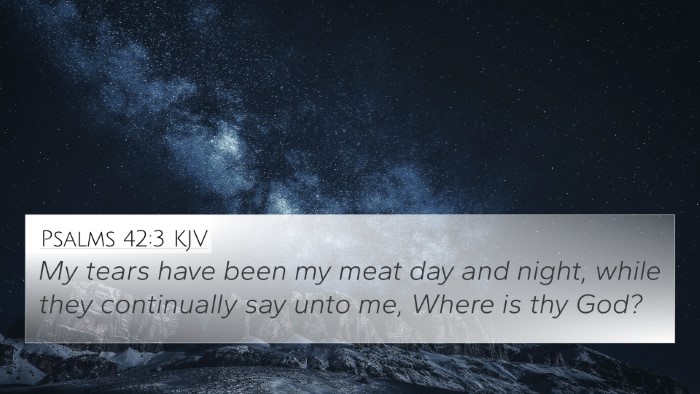Psalms 3:2 - Detailed Analysis and Commentary
Verse: "Many there be which say of my soul, There is no help for him in God. Selah." (Psalms 3:2)
This verse is part of David's lament, expressing his deep distress as he faced overwhelming opposition. In his darkest moments, he reflects on the scoffing voices of his enemies who claim that God cannot help him. The psalm reveals the struggle between his faith and the taunts of those around him.
Commentary Insights
Matthew Henry's Commentary
Matthew Henry emphasizes the desperation that David felt during his trials. The phrase "There is no help for him in God" highlights the complete abandonment felt by David at this moment. Henry notes that despite the outward circumstances and discouragement from others, David's trust in God remains. This juxtaposition serves as a reminder of God's sovereignty and faithfulness even when it seems like all hope is lost.
Albert Barnes' Commentary
Albert Barnes discusses the societal context of this verse, noting that the many who speak against David indicate a larger community's perception of his situation. Despite his despair, David identifies this outcry as a form of blasphemy against God’s ability to rescue. Barnes highlights how this declaration from others serves to strengthen David's resolve, reminding us that genuine faith often shines brightest amidst ridicule and skepticism.
Adam Clarke's Commentary
Adam Clarke points to the theological implications of declaring that there is "no help for him in God." He analyzes the Hebrew terms used and argues that such statements reveal a misunderstanding of God's merciful nature. Clarke emphasizes the importance of continuing to place one’s trust in God despite external pressures and doubts cast by others. This reinforces the idea of enduring faith amidst trials and afflictions.
Connections to Other Scriptures
Psalms 3:2 resonates with several other biblical texts that discuss themes of despair, divine assistance, and the faithfulness of God. Here are some related scriptures:
- Psalm 42:11: "Why art thou cast down, O my soul? and why art thou disquieted within me? hope thou in God; for I shall yet praise him for the help of his countenance." - A reminder to hope in God despite inner turmoil.
- 2 Samuel 15:30: "And David went up by the ascent of mount Olivet, and wept as he went up, and had his head covered, and went barefoot: and all the people that was with him covered every man his head, and they went up, weeping as they went up." - Illustrates the depth of David's distress during Absalom's rebellion.
- Psalms 22:8: "He trusted on the LORD that he would deliver him: let him deliver him, seeing he delighted in him." - Reflects the mockery similar to what David faced.
- Psalms 71:10-11: "For mine enemies speak against me; and they that lay wait for my soul take counsel together, saying, God hath forsaken him: persecute and take him; for there is none to deliver him." - A parallel of the enemies' taunts regarding God's help.
- Psalms 46:1: "God is our refuge and strength, a very present help in trouble." - Contrasts the skeptics' claims by affirming God’s protective nature.
- Psalms 118:6: "The LORD is on my side; I will not fear: what can man do unto me?" - Highlighting the assurance and support from God against adversaries.
- Isaiah 41:10: "Fear thou not; for I am with thee: be not dismayed; for I am thy God: I will strengthen thee; yea, I will help thee; yea, I will uphold thee with the right hand of my righteousness." - God’s promise to aid those who trust Him mirrors David’s ultimate reliance on the Lord.
Thematic Analysis
Psalms 3:2 engages with persistent themes throughout the Bible, particularly regarding faith in God during adversity. The voices of doubt that David experiences draw parallels with many biblical instances where believers faced ridicule while maintaining their trust in God's deliverance.
Emphasis on Faith: This psalm exemplifies the struggle between the visible circumstances and the invisible reality of God's help.
Call to Perseverance: The psalmist’s expressions serve as an encouragement for believers to remain steadfast against discouraging voices. Just as David faced threats from his enemies, modern believers can find strength in God’s promises despite external pressure.
Tools for Further Study
For those seeking a deeper understanding of this verse and connections with other scriptures, the following tools are suggested:
- Bible Concordance: A valuable resource for finding specific verse references and themes across the Bible.
- Bible Cross-Reference Guide: Tools that facilitate easier searches for verses that relate to each other thematically or contextually.
- Bible Cross-Reference System: Explains the methodology behind locating scripture that supports or contrasts specific biblical claims.
Conclusion
Psalms 3:2 serves as a poignant reminder of the challenges faced by believers. It illustrates the reality of feeling abandoned while simultaneously encouraging a steadfast faith in God’s unfailing assistance. By understanding the context through cross-references and commentaries, we can cultivate a deeper trust in God that transcends our immediate circumstances.















